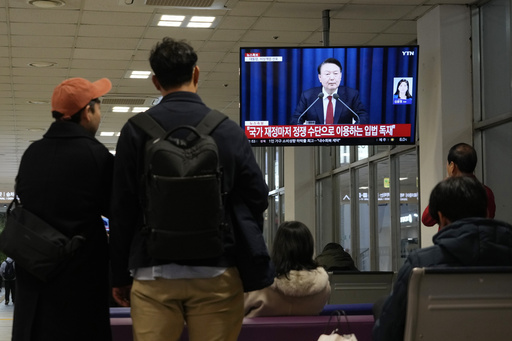
SEOUL, South Korea — The recent declaration of martial law by President Yoon Suk Yeol was short-lived, lasting only a few hours, but it has ignited a firestorm of controversy concerning his capacity to govern effectively for the remaining 2 1/2 years of his term and his adherence to democratic norms. The ruling was swiftly overturned by opposition-controlled parliament, and attempts to impeach Yoon are already under way, with one political analyst describing the martial law as “political suicide.” Yoon’s political future may hinge on whether demonstrators mobilize in significant numbers advocating for his removal.
This declaration of martial law, the first of its kind in over 40 years, raises numerous questions. Yoon justified the emergency declaration on Tuesday night, asserting his aim to eradicate “shameless North Korea followers and anti-state forces at once.” He expressed concerns about the threats posed by his liberal parliamentary opposition, who he accused of attempting to undermine key components of his proposed budget and initiating moves to impeach his key officials. Yoon, a conservative, cited these actions as serious threats to national stability.
South Korea’s constitution authorizes a president to impose military rule in situations of war or comparable national emergencies. However, if parliament objects by a majority vote, the martial law cannot be enforced. This scenario occurred Wednesday, baffling many political experts about Yoon’s motivations. His struggles with the main opposition Democratic Party do not seem to warrant a military response, leading to inquiries regarding his reasoning behind the declaration, which was evidently anticipated to be rejected by parliament.
Political analysts agree that while Yoon’s criticisms of progressive lawmakers may resonate with conservatives and moderates, his approach is seen as outdated and poorly conceived. Duyeon Kim, a senior analyst, noted that Yoon’s choice of action reflects a significant misjudgment. Yoon’s martial law mobilized military troops and armed police around the National Assembly in an effort to circumvent the vote, but 190 out of 300 members managed to reject the declaration. Subsequently, Yoon lifted the martial law decree without facing pushback.
The circumstances surrounding this rapid sequence of events suggest that Yoon did not carefully consider the repercussions of his actions. “His advisers likely tried to dissuade him from taking such a drastic step, but their counsel may have fallen on deaf ears,” said Hong Sung Gul from Kookmin University. The unfolding events have led experts to question Yoon’s ability to govern effectively.
With a majority in parliament, the Democratic Party is pressing Yoon to resign. They, along with smaller opposition parties, have initiated steps toward impeachment, with intentions to hold a vote as soon as Friday. Although Yoon has not yet publicly addressed the impeachment motion, he has delayed his official agenda. Since announcing the lifting of martial law, he has remained out of the public eye.
The coalition of opposition parties holds 192 seats in parliament, which falls short of the two-thirds majority required for impeachment. However, Yoon may face challenges from within his political ranks, as aspects of his own People Power Party have openly criticized his martial law decree, with party leader Han Dong-hun labeling it “unconstitutional.” As both the ruling party and opposition emerge in agreement that Yoon’s choice was ill-fated, the atmosphere in South Korea reflects a concerning political divide.
Conservative South Koreans carry the painful memory of the impeachment of former President Park Geun-hye in 2016. Now, with Yoon’s martial law declaration, experts suggest that his chances to complete his presidential term through May 2027 could be greatly diminished. If he were to be impeached, the decision would subsequently fall to the Constitutional Court.
The implications of Yoon’s martial law declaration may extend beyond domestic politics, potentially affecting U.S. and Japanese interests as they seek to strengthen their security alliances in the region. Political analysts warn that instability in South Korea is a troubling development for both nations, especially during an era of heightened geopolitical tensions. The White House has expressed serious concerns regarding the martial law events, with indications that they were not forewarned about the announcement. Meanwhile, Japanese Prime Minister Shigeru Ishiba articulated the need for careful monitoring of the evolving situation.
The unfolding political crisis could also complicate economic recovery efforts in South Korea. The nation’s currency, the won, recently fell to a two-year low against the U.S. dollar, though it has shown signs of recovery. The Kospi stock index experienced a decline of 1.8%. Observers suggest there is a growing perception that the president has become a substantial risk to the stability of the country, indicating that the current political status quo is untenable.
